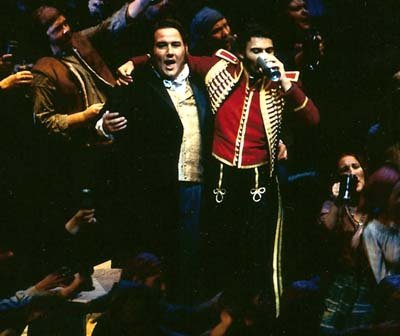|
|
|
|
|
|
|
|
| New York Times, 27 September
2001 |
| BERNARD HOLLAND |
Otello, Chicago, 22 September 2001
|
A Wagnerian Hero in Verdi's Poisoned Magic Garden
|
| LYRIC OPERA REVIEW |
|
 Verdi's
''Otello'' has seduced Ben Heppner, and it is easy to see why. This splendid
Canadian heldentenor, the opera world's Tristan of choice, falls so
naturally into the title role. He has the bearing, the command and the
dignity and, to go with them, an incendiary yet calibrated violence of
emotion. He is already a worthy actor, and Sir Peter Hall's careful
direction of detail in this new production at the Lyric Opera of Chicago has
made him a better one. Verdi's
''Otello'' has seduced Ben Heppner, and it is easy to see why. This splendid
Canadian heldentenor, the opera world's Tristan of choice, falls so
naturally into the title role. He has the bearing, the command and the
dignity and, to go with them, an incendiary yet calibrated violence of
emotion. He is already a worthy actor, and Sir Peter Hall's careful
direction of detail in this new production at the Lyric Opera of Chicago has
made him a better one.
But ''Otello'' is also one of those poisoned magic gardens to which Wagner
lures the heroes whom Mr. Heppner so often portrays. The range is not
literally too high for his voice, but the heart of Otello's music lurks just
above the heart of the singer's equipment. Mr. Heppner's occasional mishaps
on Tuesday night were announced at intermission as an indisposition, and
they were certainly that. But specific problems were certainly symptoms of a
wider incompatibility. Mr. Heppner spends much of the night dwelling in a
part of his voice that is intelligently managed but never at ease. In such a
situation, the slightest wound will magnify.
When not under threat, he is a moving Otello. Sir Peter has surrounded him
with a 19th-century world. Acts I through III occupy a rough-cut, two-tiered
gallery designed by John Gunter. Desdemona's bed in the final scene sits
under a soaring domed canopy; white sheets serve as walls. Curiously,
dramatic style seems to change from role to role. Otello and his Desdemona,
Renée Fleming, play against each other with exquisite naturalness.
Elsewhere, 19th-century melodrama in all its stiff excess is heartily
encouraged. The opening storm scene is over-the-top gesticulation under
beautiful directorial control.
Iago, sung by Lucio Gallo, is made a blustering mustache-twirler: less snake
than charging bull. Mr. Gallo, unfortunately, takes too eagerly to the idea.
He is disconcertingly crude, pushing his voice at every emotive opportunity
and not very scrupulous in matters of rhythmic symmetry. Certainly Iago is
different from his two victims, but here he seemed to be in a different
production.
Not so Ms. Fleming whose personal pliancy and vulnerability were made to
play this, one of Verdi's richest soprano heroines. The part hits some of
the hard edges of her voices, but it also invites in the vast fund of vocal
subtleties at her command. Both the sweetness and the anguish seem to come
easily, almost unbidden. The other vocal pleasure came from the evening's
Cassio, Jonas Kaufmann. He is a young German tenor, and his liquid voice and
spotless musicianship balanced exuberance with self-control. We shall hear
more from him, I am sure. Scott Ramsay (Roderigo), Michelle Wrighte
(Emilia) and Christopher Feigum (Montano) all did well. Sir Andrew Davis was
the strong and faithful conductor.
It is well to note that Verdi's love of Shakespeare did not result in
Shakespearean operas. Expansive speeches, wonderfully allusive and
gracefully metered, are in ''Otello'' reduced to a verbal shorthand.
Indecisions and quandaries receive short shrift.
In Verdian grammar, the subject of a sentence is unequivocal, the verb swift
and transitive. The direct object is reached with few if any conditional
phrases in the way. The ''h'' that distinguishes ''Otello'' from ''Othello''
is written large. |
|
|
|
|
|
|
|
|
|
|
|
|
|
|
|
|
|
|